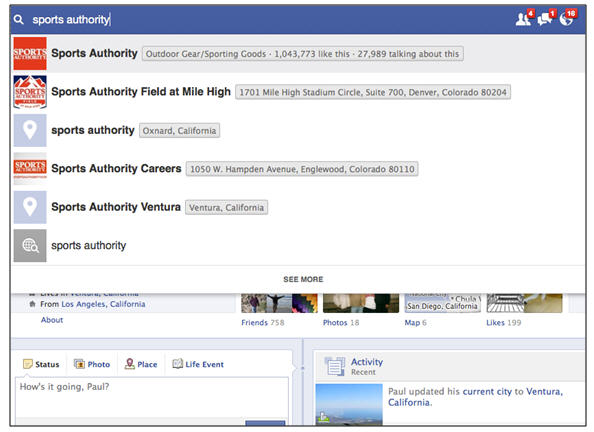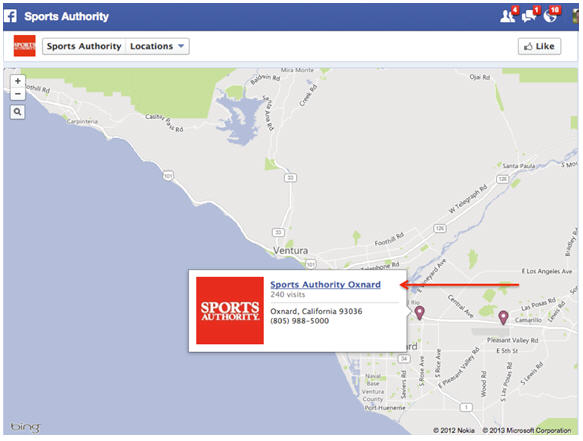Why Local Retailers Should Be Using Open Graph Markup
Last November, Chris Sherman highlighted the findings of Forrester research in his article, Forrester Rates The Top Large Search Marketing Agencies. As Chris noted, the Forrester report asked and answered this question: “What are the biggest search marketing challenges you expect to face in the next two years?” Today, I’m convinced the findings were not […]
Last November, Chris Sherman highlighted the findings of Forrester research in his article, Forrester Rates The Top Large Search Marketing Agencies. As Chris noted, the Forrester report asked and answered this question:
“What are the biggest search marketing challenges you expect to face in the next two years?”
Today, I’m convinced the findings were not only accurate, they are especially relevant for retailers. Below are the top three challenges the report uncovered:
- Integrating search marketing with other marketing
- Understanding new search engine developments
- Measuring how search impacts your business’ bottom line
First, let’s briefly review what’s happened in search over the past year or so.
Facebook Open Graph Search
On January 15, 2013, Facebook announced its Open Graph Search, and Danny wrote Up Close With Facebook Graph Search, introducing the search box and its initial capabilities.
Initially, I didn’t make the connection between search engine marketing, other retail marketing (couponing, loyalty programs, etc.), search engine developments/innovations and a retailer’s bottom line.
However, I’ve recently learned from Rio SEO that Facebook has been testing a few hidden, unknown features behind-the scenes. I’ll get into the details of these tests after a brief review of what led up to the situation we face in search today.
The New Meta Data That Matters
In June 2011, Google Webmaster Blog introduced Schema.org to create and support a common set of schemas for structured data markup on webpages.
In November 2011, Matt Cutts, referring to Rich Snippets (structured data), announced in Google’s Inside Search blog:
“This change helps us choose more relevant text to use in snippets. As we improve our understanding of webpage structure, we are now more likely to pick text from the actual page content, and less likely to use text that is part of a header or menu.”
In November 2011, Webnodes released a test showing “a 30% increase in organic search engine traffic to websites using microdata (structured markup) or similar technologies.” And, around the same time, Google announced its support for GoodRelations, which revealed “there is preliminary evidence that search results with respective extensions (structured markup) get a 30% higher click-through-rate (CTR).”
In October 2012, SMX East NYC established the first Semantic SEO Track in the Agenda.
Within its first year, Schema.org had quintupled in size, exposing a labyrinth of detailed structured markup for Events, Health, Organizations, Persons, Places, Products and Reviews. The organization of schemas, a set of ‘types,’ each associated with a set of properties, are arranged in a hierarchy that only the most experienced semantic strategists could begin to figure out and properly implement (IMHO).
To give you an idea of the level of detail provided, and required, to properly label and code a “Place,” here’s a small portion of a screenshot showing how a “Place” gets filtered-down by “type” to be labeled a “City Hall” vs. a “Church.”
Vocabularies Vs. Syntax
Then came the education curve. We all started learning the difference between vocabularies like Open Graph protocol and GoodRelations vs. syntax like RDFa and Schema.org (microdata). My good friend and colleague Barbara Starr enlightened me with the fact that “they’re all basically a type of semantic markup.”
Say no more; I’m calling it “semantic markup” from now on — if that’s okay with you! Remember, I’m a marketing guy who likes to drive growth in organic search traffic and revenue, not a semantic strategist. A lot of SEOs were not initially getting it right at the time, as there were a lot of unknowns; however, for those who stuck with it –payday is right around the corner.
SEO For Facebook Open Graph Search
Here’s where it gets interesting for me, and hopefully, you’ll see the value-add once we expose the bigger picture that we believe Facebook has in-mind and has been testing for the last two years.
As a consultant, I’m in touch with a lot of agencies and SEOs on a daily basis. One of my favorite (there are too many to list here), is an unknown, brilliant sales engineer and SEO Tyler Ludwig, who hangs his ultra-white-hat with Rio SEO, the software division of Covario.
I mention Tyler because he is the one who first told me about the test Rio is doing with Facebook , and he deserves the recognition, not me.
What you are about to see requires a little imagination because this is visionary work; it hasn’t been released or exposed yet. Based on what I’ve seen, I am certain Facebook will crush-it once they drop the other shoe.
Facebook Testing On Open Graph
You’re familiar with Facebook’s Open Graph Search, right? Here’s a screen shot from my Facebook OG search on a national sporting goods retailer. The search box is in the upper left corner of your Facebook page and it drops-down as list of search results.
In this case, the retailer has been taking part in a test where Bing is powering Facebook location map pages. Here’s how it works along with some of the preliminary findings.
The Open Graph protocol (new meta data) looks like this for a location landing page (this is what a retail store location landing page should look). I hope all top retailers have one, as many I’ve surveyed use sub-standard store locators and SEO gimmicks which will eventually go away.
When users “Like” a retailer’s store location landing page, Facebook automatically creates a Local “Child Page” using structured data from the Open Graph protocol. Note the “About” and “Locations” Tabs near the bottom of page.
Take a look at the “About” page; Facebook and the retailer now have a method for using and updating business data, e.g., address, phone number, description, longitude/latitude, etc. Note Facebook links to the retailer’s store location landing page.
Take a look at the “Locations” page powered by Bing/Facebook; the retailer now has a method for using and updating business data, e.g., logo, address, phone number, longitude/latitude, etc. Note Facebook links directly to the retailer’s store location landing page.
The Takeaways
The white-hat SEO best practice checklist for retailers has grown significantly in the last few months as a result of tests like the above with Facebook and other tests conducted on sites properly coded with structured data and semantic markup.
And, guess what? Google likes it! The preliminary findings show a remarkable lift in organic traffic. Structured data is now accessible to machine-reading search engines, Web applications, in-car navigation systems, tablets, mobile devices, Apple maps, SIRI, Yelp maps, Linked Open Data and all computers!
Structured markup presents your verified business data to a Search Engine as if it were chocolate; they love it and eat it up! Search engines understand it and know how to aggregate it for a better user experience, and display it for a boost in your CTR.
Structured business data includes rich media video content, product reviews and ratings, location and contact information, business specialty details, special offers, product information, medical data… and the list goes on.
Getting back to the Forrester findings, the following appear to be critical path for retailers wanting to improve their bottom line in 2013:
- Integrate search marketing with other retail marketing activities
- Understand new search engine developments
- Measure how search impacts your bottom line
Opinions expressed in this article are those of the guest author and not necessarily Search Engine Land. Staff authors are listed here.
Related stories
New on Search Engine Land






